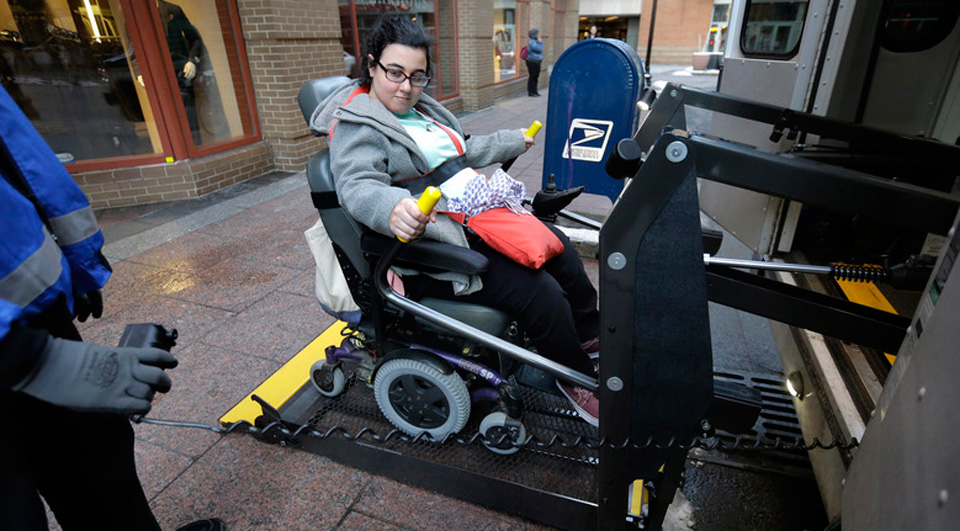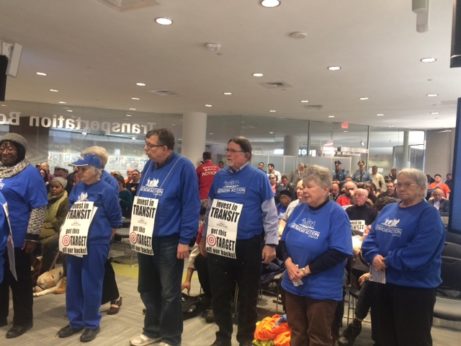
BOSTON, Mass. – Despite the Boston area’s growing and very dense urban population, America’s first mass transit system, which celebrates its 120th anniversary this year, is beleaguered by debt and hobbled by its antiquated infrastructure and successive attempts to privatize it.
The Massachusetts Bay Transportation Authority (MBTA) service area is comprised of a whopping 4.9 million people covering over 3,200 square miles in 175 cities and towns. The Commuter Rail lines, which connect most of the outlying suburbs and nearby cities like Lowell, Fitchburg, and Providence, RI, ran over 129,000 inbound and outbound fares in 2014, the most current statistical year published.
In addition to rail, subway, electric street cars, trackless trolleys, buses, and harbor ferries, the MBTA also provided nearly 7,000 paratransit trips for older adults and people living with disabilities in 2014. But one year’s statistics don’t reveal the totality of the immense transportation needs of workers, seniors, and people living with disabilities.
According to Transportation for Massachusetts, ridership on the MBTA is growing at a rate nearly twice that of the metro area’s total population. The population of the Boston metropolitan statistical area increased from 4.4 million in 2000 to 4.7 million in 2014, for a gain of 7.8 percent. MBTA ridership increased by 15 percent.
It would follow logically that with this increase in ridership and the planned expansion of biotech giants and the corporate headquarters of General Electric in the urban core, officials might want to improve Boston’s aging network of public transportation and expand services for the workforce and a growing older population. Unfortunately, logic and the MBTA’s fiscal priorities have long since parted company.
In December 2016, the MBTA’s Fiscal Control Board (FCB) sent its annual report to the General Court, the Massachusetts state legislature, summarizing its operations as being “basically flat.” Arithmetic, however, did not deter the Board’s political objective to defund public transit.
Last weekend, the MBTA announced major cuts in service and proposed areas of privatization. Perhaps the Board thought the people of Massachusetts could be railroaded? If so, they were wrong. The monthly MBTA Board meeting was jammed with justifiably outraged riders including members of Mass Senior Action Council and the CPUSA Boston club.
The reduction or suspension of the “premium” RIDE paratransit service would affect 9,000 of the most vulnerable of the disabled who use the system. Those riders would lose the ability to work or go to school; it would cut access to medical care, as well as their transportation for shopping, socialization, and church attendance.

In addition to the Board’s attack on transportation for older adults and people living with disabilities, it is also aiming its sights at Commuter Rail weekend service, which would have a devastating effect on local residents who have to work weekends and would force them to use cars. There are no public bus routes in many of the communities served by the Commuter Rail lines.
These proposed cuts to the Commuter Rail will also have a major impact on the entertainment and tourist business, since many visitors prefer not to drive in downtown Boston, especially when there is a large event such as a Red Sox game at Fenway Park. The Chamber of Commerce is up in arms and rightfully so.
Beyond the shortsighted and damaging cuts proposed to The RIDE and Commuter Rail, there are proposed efforts to privatize areas of service, primarily machine maintenance. At the MBTA Board meeting, union members and representatives of Machinists Local #264 testified to the long training and highly skilled nature of their work that would be replaced by inexperienced workers with questionable training.
Despite its long history of service to the Boston area, the MBTA’s current leadership is hell-bent on implementing reckless budget cuts and unsafe privatization measures without public input or democratic debate. The cuts were announced on the weekend of March 17; the 2018 budget must be finalized by April 15. It seems the MBTA Board is intent on jamming the cuts and changes through an abbreviated time frame of public discussion and testimony.
Tillyruth Teixeira contributed information from the March 20, 2017 MBTA Board meeting for this story.












Comments